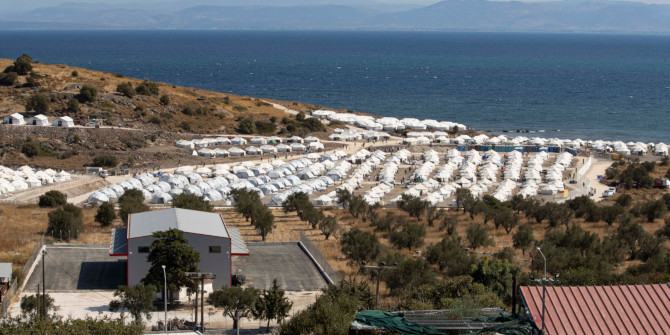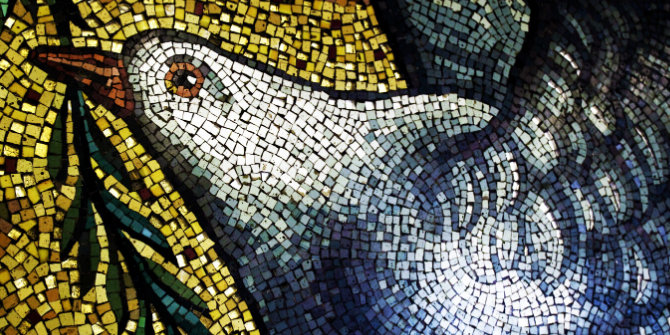EU foreign policy has long been oriented around the promotion of key values such as democracy and respect for human rights. But is this value-driven approach still viable? Hans Kribbe argues that in a world where the United States no longer appears willing to provide global leadership, the EU will have to put pragmatism above its principles.
“America is back” are three words Joe Biden is not likely to use again any time soon. Addressing the nation after the last US plane left Kabul, the president made clear there will be no new military adventures abroad, unless they demonstrably serve US national security interests. The realist Biden seems to reject empty talk. Expect brutal honesty instead. For the triumph of the Taliban, he blames Afghans. European NATO allies, he made clear, should stop whinging.
Biden’s candour ought to be welcomed. It focuses Europe’s minds on one of the biggest security challenges the continent faces: the war, instability and poverty on its doorstep. Whereas US security interests in the Sahel, the Maghreb or the Middle East seem remote, for Europe it is the opposite. Historically, the continent’s fate is fused with the territories that lie beyond its borders.
Unfettered exposure to the rise and fall of empires in its hinterland has always been a decisive feature of European politics. Herodotus describes how some 2,500 years ago Greek city states fought off the Persian Empire. In 711, Muslim armies began their conquest of the Iberian Peninsula, turning Spain into an emirate for nearly 800 years. Following the fall of Constantinople in 1453, the Ottomans moved deep into central Europe. Operating from Rabat, Algiers and Tripoli on the North African coast, so-called Barbary pirates raided coastal towns for booty and slaves in Spain, Italy and even as far north as England and Holland, until the French finally seized Algiers in 1830.
As America’s “unipolar moment” recedes, history is rapidly filling the void US power leaves behind. A massive influx of Afghan refugees looks hard to avert. Failed states such as Libya, Syria and Yemen are at risk of becoming incubators for piracy, terrorism and extremism. Ukraine and Belarus are a source of instability on Europe’s eastern flank. Russia and Turkey act with agility and strategic purpose to safeguard their interests in this unsteady environment. Can the EU do the same?
To make up for America’s retreat, at least in part, Josep Borrell, the EU’s High Representative for Foreign Affairs and Security Policy, has called for the creation of a new EU reaction force of 5,000 troops. “Sometimes there are events that catalyse history, that create a breakthrough”, he correctly argues. Yet the EU needs far more than soldiers. It needs an entirely new strategic orientation towards its neighbourhood, a strategic compass rooted in geopolitics and history rather than universal rules, free trade and other liberal values.
Those who feel repulsion at the thought of a migration deal 2.0, be it with Turkey, Pakistan or another neighbour, had better buckle up. Such deals are the shape of things to come.
Take the example of Turkey. For decades the EU has sought to pull the country into its rules-based order, using carrots and sticks to cajole Turkey into transforming itself into a modern European state. That approach is no longer viable. Neither Erdoğan nor the EU still covet Turkish membership. So, rather than trying to turn Turkey into a European-style democracy, why not use the EU’s influence for more attainable purposes, such as getting Turkey to behave in ways that align with Europe’s strategic interests? Wasting valuable carrots and sticks on causes that cannot be achieved – and that most EU states no longer want to achieve – is the definition of bad foreign policy.
The EU’s migration deal in 2016, attacked by many as a sacrilegious form of realpolitik, provides the principle of a more judicious policy. The deal construes Turkey not as a member state in waiting but as a buffer for the EU, a zone of relative tranquillity that cushions the impact of turmoil further afield. As a buffer, Turkey can make an important contribution to Europe’s security. Getting the country to make that contribution is precisely the strategic goal the EU should now be trying to achieve.
Plainly, it is not Erdoğan’s ambition to become Europe’s buffer state. Harbouring yet more refugees is an unpopular proposition among Turks. Moreover, Turkey has strategic goals of its own. They include becoming the preeminent power in the Muslim world and taking its share of natural resources found in the Eastern Mediterranean. But these goals simply become elements in the negotiation matrix that underpins all interest-based diplomacy. Mutually beneficial trade-offs, rather than the chapters of the EU acquis, should provide the substance of EU-Turkey dialogue in the future.
Obviously, the EU and Turkey have different interests, which sometimes clash. They are “systemic rivals”. But such rivalry is not incompatible with interest-based dealmaking. Look at how Erdogan and Putin, on opposite ends of wars in Syria, Libya and Nagorno-Karabakh, are still able to make deals. There are lessons the EU should learn here. Turkey’s reach in the Middle East is deep. Erdoğan has no qualms about working with the Taliban government. There is every reason for the EU to engage Turkey, still a NATO ally, in the sort of dealmaking that can mitigate geopolitical threats. The same applies to other key states in the region, such as Afghanistan’s neighbour Pakistan.
Of course, it is to the costs of making deals with so-called “Pariah states” and “thuggish” strongmen that EU purists object. States, they say, should do what is right because it is right. However, Europe won’t get Erdoğan to do anything without something in return, which in the 2016 migration deal was mostly cash. Yet the biggest concern is political not financial. Quid pro quo dealmaking with men like Erdoğan disrupts a self-image that generations of EU-politicians have honed, cherished and invested in. The Union, this noble narrative goes, exists to edify its neighbours, not to give them pay-offs and stoop to the autocrat’s level.
Sadly, it is a type of high-mindedness Europe can afford less and less. Those who feel repulsion at the thought of a migration deal 2.0, be it with Turkey, Pakistan or another neighbour, had better buckle up. Such deals are the shape of things to come. The post-American world promises to be a violent and fickle place, and whether the EU will rise to the challenge no one knows. One thing is certain, though: for squeamishness about dealmaking with dictators it holds no place.
Note: This article gives the views of the author, not the position of EUROPP – European Politics and Policy or the London School of Economics. Featured image credit: European Council




